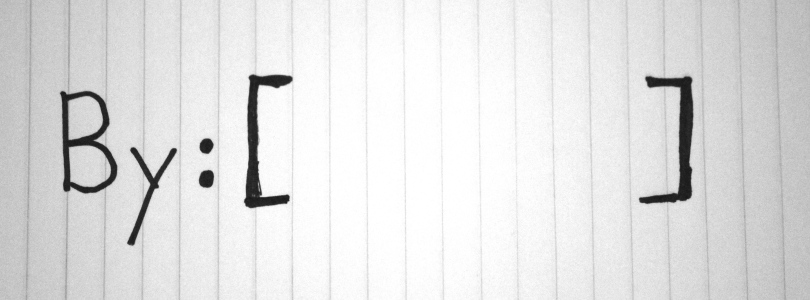In journalism, sources anchor what lies between quotation marks. Anonymous sources don’t cut it. Without ownership, a quote’s claim, accusation or emotion loses impact. While circumstances at times warrant anonymity, [good] journalists strive to live by a code of attribution. Nails on the chalkboard do not compare to the words “off the record.”
Most of what I’ve learned about journalism—from the power of attribution to the beauty of word economy—has come from my father. Within his stories, I’ve witnessed the human voice emerge among the facts, figures and leads. I’ve learned that the human element depends on the bond built between the journalist and the source. The former needs a name to tie to the story, and the latter needs the assurance that his words will remain his own. When the relationship works, the two can tell a story that can captivate an audience and, in some cases, move it to action. Part of that power comes from a name that makes a quote seem more human—more ‘real.’
The emphasis I’m placing on authorship concerns the work we’ve done with Open Heart, Open Mind. Unnamed authors have written about half the pieces we’ve published. It’s a choice we leave to the writer. The fact that they are sharing their story is more than I could ask. Given my feelings about attribution, however, I initially felt that identifying the author would, by default, be more powerful:
What’s the point of sharing these stories without naming the writer?
The answer: Quite a bit, in fact.
We began this project with the belief that a common thread exists among individual accounts of mental illness. A handful of submissions later, I feel we’re beginning to see the stitching that binds them. As I read the essays, their singular voices merge into a different kind of unnamed author—human experience. We’ve been fortunate to receive an impressive variety of submissions, and yet, the same themes—trial, alienation, resilience and so on—emerge again and again. No matter the author, these stories seem to draw from the same source of emotion and insight.
This hidden unity speaks to what we have to gain from sharing our experiences with each other. Imagine your amazement when you pull a secret paragraph from your personal history and discover that the person sitting in front of you recognizes how that part of your story fits into his life. Seeing yourself in the life of another; that’s when understanding takes place. Anonymity contains a bit of that magic. It affirms that human experience exists without a sole owner, and because of that, we have the chance to realize the inherent connections we share.
Anonymous or otherwise, the stories we seek to share emerge with a significant helping of courage. Quite a few of the writers for OHOM have expressed their concern that their experiences won’t be viewed as “legitimate” or “believable.” That has never been the case, but I cannot blame them. I held the same fear when I first opened up to those close to me. Will they take me seriously? Will be viewed as a reliable ‘author’? I just wanted to be recognized. Scratch that, I wanted my experience to be recognized. Within the scope of our project, that recognition requires both stories written with a named author and those without. The former confirms that these narratives come from the very people we know, and the latter celebrates the collective nature of human experience.
Whether you choose to attach a name to your story, know that your voice will be heard. With mental illness, the “what” is always more important than the “who.”
But more importantly, by sharing a part of your life, you prove that so many others are not alone.
And for that, I thank you.
-Jake Morgan, editor of Open Heart, Open Mind
